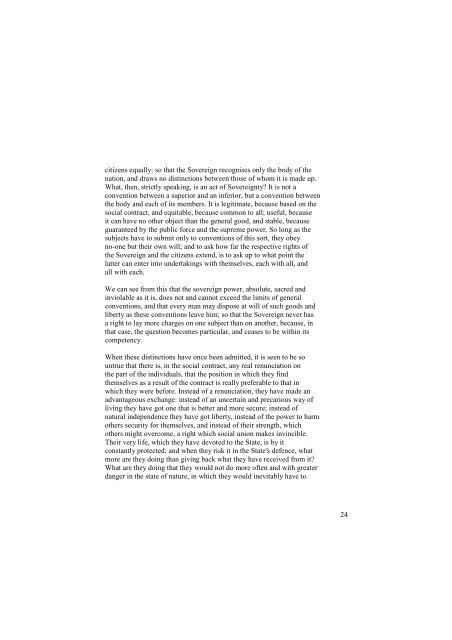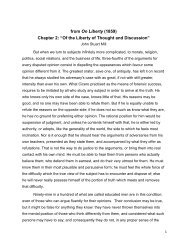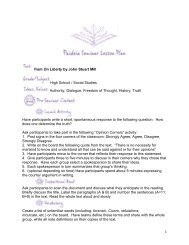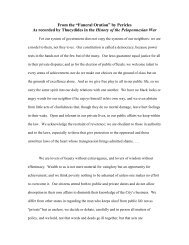Rousseau_contrat-social
You also want an ePaper? Increase the reach of your titles
YUMPU automatically turns print PDFs into web optimized ePapers that Google loves.
citizens equally; so that the Sovereign recognises only the body of the<br />
nation, and draws no distinctions between those of whom it is made up.<br />
What, then, strictly speaking, is an act of Sovereignty? It is not a<br />
convention between a superior and an inferior, but a convention between<br />
the body and each of its members. It is legitimate, because based on the<br />
<strong>social</strong> contract, and equitable, because common to all; useful, because<br />
it can have no other object than the general good, and stable, because<br />
guaranteed by the public force and the supreme power. So long as the<br />
subjects have to submit only to conventions of this sort, they obey<br />
no-one but their own will; and to ask how far the respective rights of<br />
the Sovereign and the citizens extend, is to ask up to what point the<br />
latter can enter into undertakings with themselves, each with all, and<br />
all with each.<br />
We can see from this that the sovereign power, absolute, sacred and<br />
inviolable as it is, does not and cannot exceed the limits of general<br />
conventions, and that every man may dispose at will of such goods and<br />
liberty as these conventions leave him; so that the Sovereign never has<br />
a right to lay more charges on one subject than on another, because, in<br />
that case, the question becomes particular, and ceases to be within its<br />
competency.<br />
When these distinctions have once been admitted, it is seen to be so<br />
untrue that there is, in the <strong>social</strong> contract, any real renunciation on<br />
the part of the individuals, that the position in which they find<br />
themselves as a result of the contract is really preferable to that in<br />
which they were before. Instead of a renunciation, they have made an<br />
advantageous exchange: instead of an uncertain and precarious way of<br />
living they have got one that is better and more secure; instead of<br />
natural independence they have got liberty, instead of the power to harm<br />
others security for themselves, and instead of their strength, which<br />
others might overcome, a right which <strong>social</strong> union makes invincible.<br />
Their very life, which they have devoted to the State, is by it<br />
constantly protected; and when they risk it in the State’s defence, what<br />
more are they doing than giving back what they have received from it?<br />
What are they doing that they would not do more often and with greater<br />
danger in the state of nature, in which they would inevitably have to<br />
24











